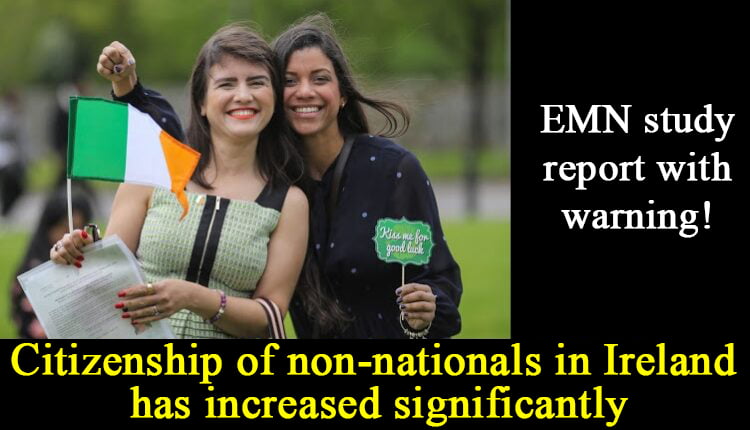DUBLIN: The study shows that the acquisition of citizenship by non-nationals in Ireland by naturalisation is on the rise.
The number of EU citizens among the new Irish citizens is growing exponentially. The number of EU citizens increased from 4% in 2011 to 49% in 2018. New research by the Economic and Social Research Institute (ESRI) and the European Migration Network shows a 45% increase in seven years. In the last decade, the number of people who have acquired citizenship through such naturalisation has increased dramatically.
Between 2006 and 2018, more than 1,45,800 people were granted Irish citizenship through naturalisation – research reveals. The study was conducted as part of research in the European Union. The research report says that naturalisation is considered as an important way for immigrants to access citizenship and related rights. In 2018 alone, more than 8,200 people were granted Irish citizenship through naturalisation, and in 2019, approximately 5,800.
The number of people who obtained Irish citizenship through naturalisation increased rapidly in 2010 and peaked in 2012. Since then, it has been steadily declining, in line with EU trends, the report says.
The European Migration Network (EMN) warns against a significant increase in the number of people gaining Irish citizenship through naturalisation. EMN reminds that citizenship avenues must be timely and transparent in this regard. About 4% of the country’s population has recently acquired citizenship.
Most EU nationals are from Poland, Romania and the UK
Most EU citizens who have acquired Irish citizenship through naturalisation are from Poland, Romania and the UK. Between 2016 and 2018, when Brexit was confirmed, the flow of people from the UK increased sevenfold.
Non-EU nationals who have been gaining Irish citizenship through naturalisation since 2005 are from Nigeria, India and the Philippines.
Ireland also leads in naturalisation fee collection
Ireland is one of the four EU countries that reported the highest naturalisation fees in an EMN study of 24 EU member states, along with the UK, Austria and the Netherlands.
Applicants must initially pay €175, and a further certification fee of €950 applies for successful adult applicants with €200 for children and certain other cases. Refugees and stateless individuals are exempt from the certification fee.
The report says there have been delays in the processing of naturalisation applications as a result of the 2019 High Court judgment on housing and COVID-19 restrictions.
Character certificate of applicants
The Department of Justice reported that by October 2020, it will take a year to process applications that are straight forward, as more complex applications take longer. There are three main approaches to Irish citizenship: citizenship by birth, birth on the island of Ireland, and naturalisation.
Applicants for naturalisation must have resided in Ireland for at least five years. They must be of good character, intend to stay in Ireland, and make a declaration of loyalty to the State. Spouses and civil partners of Irish citizens and certain other categories can apply for naturalisation after three years.
The Justice Department reports that the main reason for rejecting applications is the inability to prove good character and the inability to meet the criteria for residence.


Comments are closed.